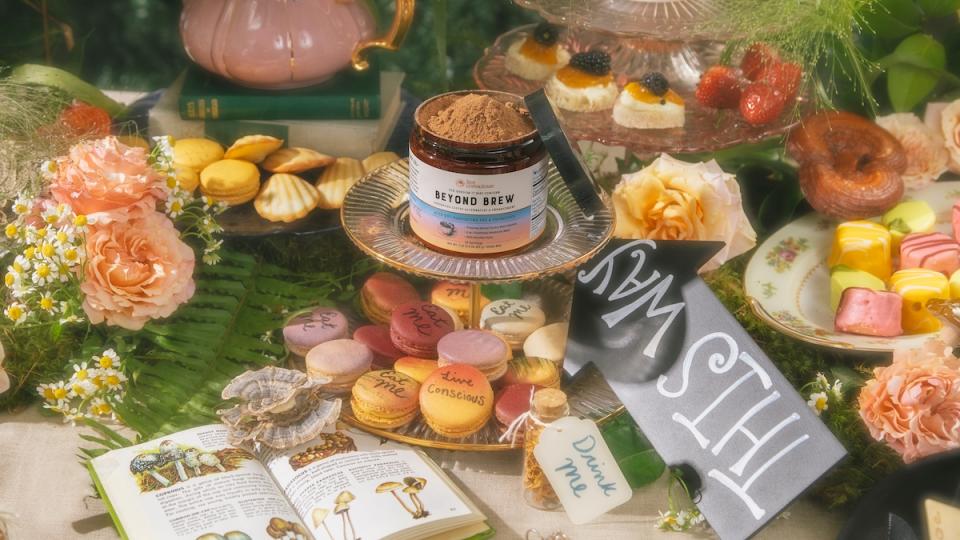Mushroom Coffee Sounds Weird... but How Does It Taste?
You probably already know the benefits of mushrooms: They’re a highly versatile superfood whose earthy flavor and nutrient density has made them an ideal meat substitute. One ingredient they don't seem an obvious substitute for is coffee, but that hasn't stopped people from swapping them in — and as it turns out, mushroom coffee substitutes are very tasty. Recently, they've become popular with people who are either looking to lower their caffeine intake or enjoy a cup of joe without the bitterness, jitters, or energy crashes. It would take a lot for me to give up my daily cup (or two) of regular coffee, but I was curious to discover how the mushroom version measured up. Read on to learn more about the history, health benefits, and taste of this strange-sounding drink.
Is mushroom coffee a new thing?
Mushroom coffee has recently become trendy, so you might think it's just the newest wellness fad — but that’s not exactly true. According to Healthline.com, mushrooms were used as a coffee substitute in Finland during World War II when coffee beans weren’t available. "There’s also an extensive history of culinary and medicinal use of mushrooms in Asian countries, specifically for Chinese medicine, for their nutritional and health benefits," Healthline states. A Food52.com article goes into more detail about the coffee’s wartime origins: Chaga mushrooms were native to Finland, and when coffee was in short supply, Finnish people drew on this natural resource out of necessity. However, now that it's common to cut out food or drink that irritates our bodies — many people suffer from caffeine sensitivities and stomach upset due to coffee — the mushroom version of the drink is enjoyed primarily by choice.
What are the health benefits of mushroom coffee?
Mushrooms have a variety of health benefits that they retain in coffee form. They’re known for having antioxidant properties, as well as a range of vitamins and minerals. Additionally, the adaptogens in mushroom coffee may help balance cortisol levels, which can ease stress. While more detailed research around mushroom coffee is needed, the vegetable itself is well-known for the immune and cognitive support (including for memory and concentration) it provides. Lion’s Mane, a mushroom variety used in several mushroom coffee brands, has been studied for its potential ability to protect against diseases like Parkinson’s and Alzheimer’s.
How does mushroom coffee taste?
I have to admit, I was skeptical about how good a cup of mushroom coffee would taste — but it surprised me. The brand I tried, Beyond Brew (Buy from Live Conscious, $39.99), includes a mix of six mushrooms: Lion's Mane, Reishi, Chaga, Cordyceps Sinensis, Cordyceps Militaris, and Turkey Tail. The blend also features organic cacao, which “aims to lower blood pressure, improve blood flow, and fight cell damage through its naturally-occurring flavonols,” and Organic Tahl Gum, an Acacia plant derivative that helps with digestion.
I was pleased to find that making the mushroom coffee was easy: Add 2 teaspoons to a hot or cold beverage of your choice, and stir to prevent clumps from forming. The texture is fine and powdery, not unlike instant coffee. Aiming for the purest experience, I took my first cup straight-up, mixed only with hot water in a mug. I mixed my second cup with both hot water and milk. Turns out, I liked the taste of both preparations. My fears of a musty sip were unfounded — the cacao flavor was most prominent in the blend. The drink reminded me of hot chocolate, without any of the cloying sweetness.

If you're someone who needs a caffeine boost, be warned that Beyond Brew has just a tenth of the caffeine found in a regular cup of coffee. While I didn’t immediately notice a boost in my focus after drinking (and I’d have to consume it consistently to see any cumulative health benefits), I appreciated the light and chocolatey flavor. I'd happily sip this on an afternoon when I'm craving a piece of chocolate. A cup of Beyond Brew has just 20 calories, and you know it's nutritious even though it tastes like a treat; I recommend trying it blended into a regular cup of coffee, creating a healthier take on the mocha.
My conclusion? I don’t think I would use Beyond Brew as a coffee replacement, because the caffeine amount is too low — and as someone who’s not a morning person, I need all the energy boosting I can get in my morning java. But if you’re looking to cut back on caffeine, this might be the perfect coffee alternative for you.
Woman's World aims to feature only the best products and services. We update when possible, but deals expire and prices can change. If you buy something via one of our links, we may earn a commission.
Questions? Reach us at [email protected].
